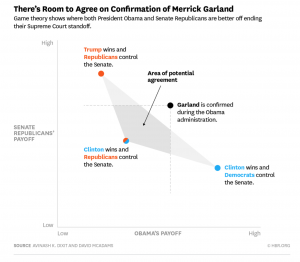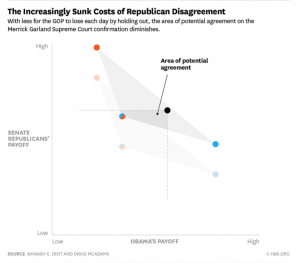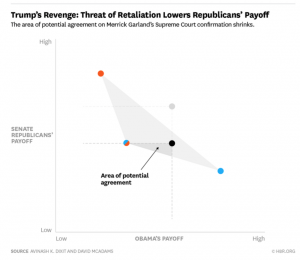Game Theory in Politics: Appointment of a Supreme Court Justice
One of the many reasons why this upcoming presidential election is so important is that the next president will probably have the duty of appointing a Supreme Court justice to fill the vacant seat left by the late Justice Antonin Scalia. Because justices have the right to hold their office until death or retirement, this appointment will certainly have an impact for the next generation of American politics. Of course, the process of filling this seat has been met with a political stalemate with the Senate refusing to consider the nominee chosen by President Obama, a judge named Merrick Garland.
This political stalemate is like a game where the two parties are negotiating a deal. The linked article from Harvard Business Review describes the probability and potential outcomes that could arise depending on each party’s strategy and decisions.
As seen by the graph below, different election outcomes will alter the payoff of each party involved. Most probable is a payoff illustrated with the shaded area labeled “Area of potential agreement.” If this is the case, then both parties would benefit if Congress accepts the moderate Garland as the Supreme Court Justice before the next term of presidency.
However, the politics of this procedure is more complex than the graph shows. For example, there is the case of overconfidence where Democrats or Republicans are more confident in their ability to win so they will not want to negotiate to allow Garland’s confirmation. There is also the case of Republicans’ having less to gain from reaching an agreement, as their initial public refusal has already resulted in intense voter disapproval. Thus the graph below shows a modified area of potential agreement:
The presidential candidates themselves can strongly influence the outcomes as well. Trump’s unpredictability and polarizing views could hurt the Republican Senate’s payoff. The GOP “civil war” that is currently wreaking havoc could be worsened if Congress accepts Garland, thus weakening their own chances for re-election. The graph below shows a smaller area of potential agreement in this case:
Politics is a tricky concept with so many moving parts. However, certain probabilities and outcomes can be calculated to maximize payoff, not unlike the in-class examples of sports or economics. This case is more complex, but similar in general theory. Politics is essentially a game where there are sets of participants (Republicans and Democrats) with different strategies (political agendas) and different payoffs (varying amounts of power in government). In this case, there is no clear dominant strategy because of so many outside factors, like the actions of the presidential candidates. For now, our best influence over this situation is to go out and vote on Election Day!
https://hbr.org/2016/09/applying-game-theory-to-the-supreme-court-confirmation-fight



